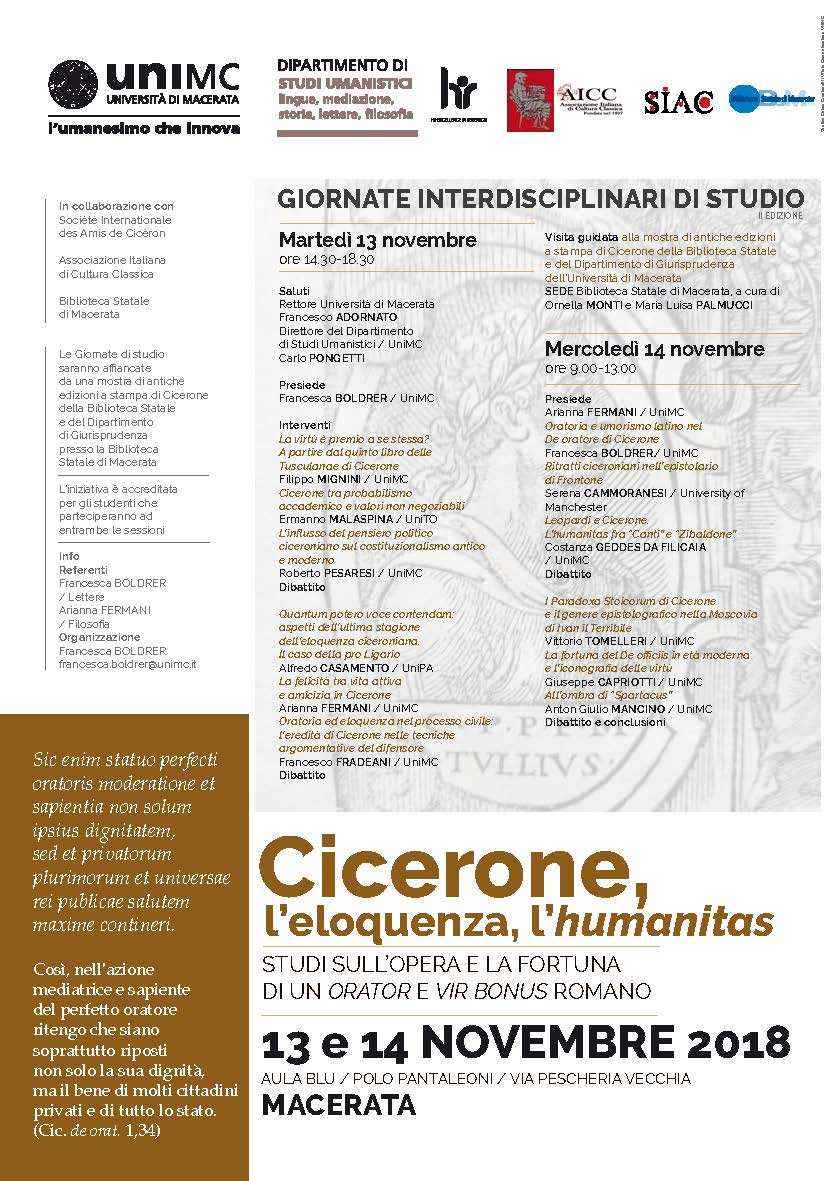La virtù è premio a se stessa? A partire dal quinto libro delle Tusculanae di Cicerone - Virtus as Its Own Reward? Cicero's Tusculanae Book 5
DOI:
https://doi.org/10.13135/2532-5353/4125Abstract
Riassunto Il saggio intende studiare la fortuna della tesi esposta da Cicerone nel
quinto libro delle Tusculanae disputationes, circa la perfetta equivalenza di virtù e
felicità, in alcuni autori della storia della filosofia occidentale fino a Kant. La tesi
esposta da Cicerone, tipica della tradizione stoica, fonda la virtù sulla perfezione
dell’intelletto naturale e può essere considerata, con alcune varianti significative
concernenti la sufficienza della virtù per la felicità, comune alla filosofia classica
greca e romana. Caratteristica della filosofia classica antica è comunque la prospettiva
immanente e perfettamente naturale nella quale il rapporto tra virtù e felicità
viene concepito. Dalla filosofia cristiana, in particolare nei modelli elaborati
da Agostino e da Tommaso, il nesso virtù-felicità viene spezzato perché, pur considerando
la virtù condizione necessaria per la felicità, quest’ultima viene assunta
come premio trascendente della virtù, donato dalla grazia divina in un’altra vita,
mediante la visione beatifica dell’essenza di Dio. Lo schema dell’unico orizzonte
della natura viene infranto e questa, da principio divino, viene posta come effetto
di una sopranatura, capace di determinarla con modalità non attingibili dalla sola
ragione. Alcuni autori della prima filosofia moderna, quali Pomponazzi, Bruno,
Spinoza, tornano alla classica concezione della natura concepita come principio
divino, rifiutando ogni idea di sopranatura, e riprendono alla lettera l’equivalenza
posta da Cicerone tra virtù e felicità. La posizione di Kant, appena accennata,
torna a spezzare il nesso tra virtù e felicità, in favore della totale autonomia e purezza
della morale, ma in una prospettiva assolutamente naturale e razionale. In
definitiva, la storia della tesi ciceroniana concernente il nesso virtù-felicità si rivela
in grado di chiarire la stessa storia della civiltà occidentale e il ruolo svolto
in essa dalla tradizione giudaico cristiana.
Abstract The essay studies the way in which several figures in the history of western
philosophy up to Kant have addressed the thesis, expounded by Cicero in the
fifth book of the Tusculanae disputationes, about the perfect equivalence of virtue
and happiness. This notion, widely associated with the Stoic tradition, establishes
as the foundation of virtue the perfection of the natural intellect and can be found, albeit with some significant variations concerning the sufficiency of virtue for happiness, in both Greek and Roman philosophy. Common to both strands of the classical tradition is the immanent and perfectly natural perspective in which they frame the relationship between virtue and happiness. Philosophers writing in the Christian tradition, particularly Augustine and Aquinas, break the virtuehappiness nexus: while they consider virtue a necessary condition for happiness, the latter is understood as a transcendent reward for virtue, given by divine grace in another life and through the beatific vision of the essence of God. The model positing nature as the only horizon is displaced. And so, nature is no longer a divine principle, but is identified as the effect of a “supernature”, which is in turn capable of determining nature in ways other than through reason alone. The work of early modern philosophers, including Pomponazzi, Bruno, and Spinoza, charts a return to the classical conception of nature as a divine principle, rejecting the idea of a “supernature”, and re-establishes Cicero’s equivalence between virtue and happiness. Kant’s contribution to the debate represents another instance of fracture of the link between virtue and happiness, as he argues for the total autonomy and purity of morality, from an absolutely natural and rational perspective. Ultimately, the history of this particular Ciceronian thesis offers an illuminating perspective on the history of Western civilization and the role that the Jewish-Christian tradition has played in it.
Downloads
Downloads
Published
How to Cite
License
Authors who publish with this journal agree to the following terms:
- Authors retain copyright and grant the journal right of first publication with the work simultaneously licensed under a Creative Commons Attribution License that allows others to share the work with an acknowledgement of the work's authorship and initial publication in this journal.
- Authors are able to enter into separate, additional contractual arrangements for the non-exclusive distribution of the journal's published version of the work (e.g., post it to an institutional repository or publish it in a book), with an acknowledgement of its initial publication in this journal.


 Ciceroniana On Line is recognised by ANVUR (the National Agency for the Evaluation of the University System and Research) as a CLASS A journal for the Sciences of Antiquity, Philology, Literature and History of Art (
Ciceroniana On Line is recognised by ANVUR (the National Agency for the Evaluation of the University System and Research) as a CLASS A journal for the Sciences of Antiquity, Philology, Literature and History of Art ( The journal is included in DOAJ. The DOAJ listing of the journals is available at
The journal is included in DOAJ. The DOAJ listing of the journals is available at  The journal is indexed in
The journal is indexed in  The journal has been included in ERIH PLUS. The ERIH PLUS listing of the journals is available at
The journal has been included in ERIH PLUS. The ERIH PLUS listing of the journals is available at 

